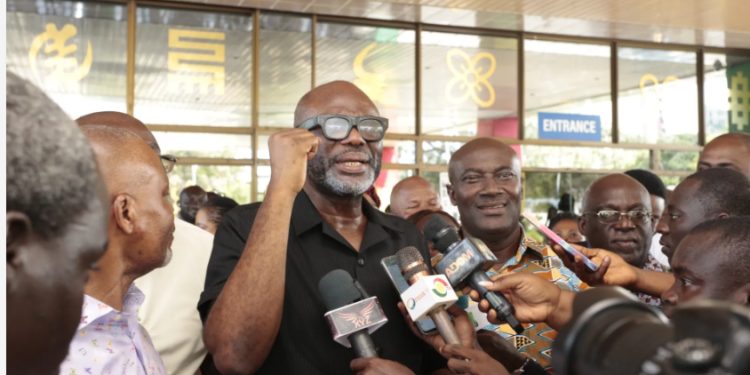The Ghana Union of Traders Association (GUTA) has declared that it will sign a social contract with political leaders vying for the presidency in 2025. This agreement would be based on their economic policies and manifesto commitments.
Dr. Joseph Obeng, President of the Association, indicated that the decision was made to ensure that the business community and Ghanaians hold the next president accountable for his words.
“We will subject the policies and promises of political parties and individual aspirants to a credibility litmus test and hold them accountable. We will, therefore, sign a Memorandum of Understanding (MoU) with them ahead of the 2024 elections,” he said.
Dr Obeng was speaking to the Ghana News Agency in Accra on Wednesday, February 8, following the delivery of the vision of Dr Mahamudu Bawumia, presidential candidate for the New Patriotic Party (NPP).
He said that they had seen some indications of candidates beginning to listen to and align with the requirements of the business community in their visions.
He stated that their observation was based on their participation at the National Economic Summit hosted by the leader of the Movement for Change, Mr Alan John Kwadwo Kyerematen, as well as Dr Bawumia’s outline of his vision for Ghana.
“We want the politicians to know that this year’s election is not going to be business as usual. We will critically assess their policies to see how it will be helpful to businesses, particularly, Small and Medium-sized Enterprises (SMEs)” he said.
Dr. Obeng added that the business sector was interested in policies which, when implemented, would support business growth while contributing to revenue generation through taxation and job creation for the youth.
He encouraged all political parties, and their leaders, as well as individual aspirants to extensively engage the association and incorporate their needs in the drafting of their manifestoes.
Dr. Bawumia, in articulating his vision for the country, said that he would repeal the Electronic Transactions Levy (E-levy), Emission Tax, and the 15% Value Added Tax on electricity if he becomes president.
He talked about creating a flat tax for individuals and SMEs, simplifying the corporate tax system, and implementing a VAT regime to make tax payments easier and more business-friendly.
Dr. Obeng spoke on tax regimes, saying that when applied successfully, the flat tax “will prevent under declaration and under invoicing and make the government get the right taxes.”
He did, however, encourage the Vice President to use his position to influence the implementation of the specified policies, stating that “some of the solutions can be implemented in the shortest time possible.”
Latest Stories
-
SSTN Ghana Chapter reaffirms commitment to economic growth under new leadership
3 minutes -
Inlaks strengthens leadership team with key appointments to drive growth across sub-Saharan Africa
1 hour -
Green Financing: What Ghana’s Eco-startups need to know
1 hour -
CHAN Qualifiers: Amoah confident of beating Nigeria
1 hour -
Governments deprioritising health spending – WHO
1 hour -
Lordina Foundation brings Christmas joy to orphans
1 hour -
Yvonne Chaka Chaka to headline ‘The African Festival’ this December
1 hour -
Nigerian man promised pardon after 10 years on death row for stealing hens
1 hour -
MGA Foundation deepens support for Potter’s Village
2 hours -
Galamsey: One dead, 3 injured as pit collapses at Nkonteng
2 hours -
Man, 54, charged for beating wife to death with iron rod
2 hours -
MedDropBox donates to UG Medical Centre
2 hours -
Afenyo-Markin urges patience for incoming government
2 hours -
Case challenging Anti-LGBTQ bill constitutionally was premature – Foh Amoaning
3 hours -
Fifi Kwetey: An unstoppable political maestro of our time
3 hours

